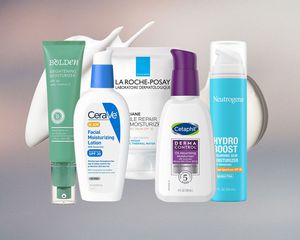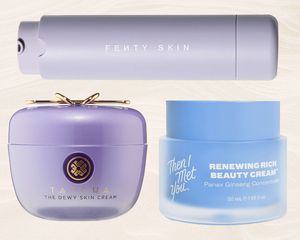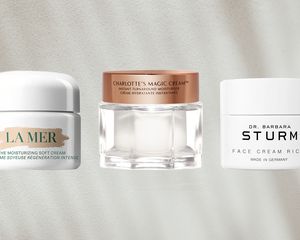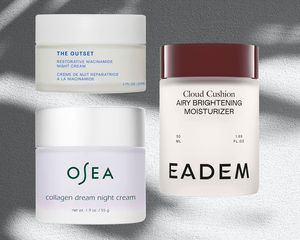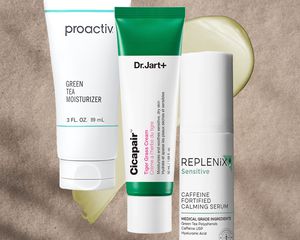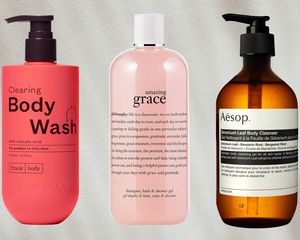:max_bytes(150000):strip_icc()/kukuinuts-424a30e9931f4ebd90d29539896f4770.jpg)
Getty Images
If you have dry skin and love skincare, chances are, you’ve tried as many popular cleansers, exfoliators, moisturizers, and serums as you can get your hands on. While it’s always helpful to consider what’s worked well for other people with the same skin type, sometimes focusing solely on cult-favorite products leads us to ignore other, lesser-known skincare staples that are just as (if not more) effective. Think about it. If you have dry skin, you’ve likely stuffed your skincare routine with products ripe with hyaluronic acid, glycerin, aloe vera, petroleum, and any other number of frequently searched, highly touted ingredients. But have you ever considered kukui nut oil?
If you’ve never heard of the ingredient, you’re not alone. After all, it’s native to Hawaii and, as such, is more common in Hawaiian (and Hawaiian-inspired) beauty and skincare products. But once you learn about what it is—and, better yet, what benefits it offers—you’ll want to incorporate it into your routine ASAP.
Key Ingredients
- Type of ingredient: Hydrator
- Main benefits: Deeply hydrates skin, improves texture, heals and protects skin
- Who should use it: While kukui nut oil is typically gentle enough for most skin types, Hanalei founder Alice Kim says that it is especially transformative for dry and/or aging skin thanks to its powerful hydrating and nourishing properties.
- How often can you use it: Generally speaking, kukui nut oil can be used twice daily. Of course, it depends on your particular skin type and how it reacts to the ingredient.
- Works well with: According to Kim, kukui nut oil blends especially well with ingredients that are lipophilic (aka they can dissolve in oil).
- Don’t use with: Thanks to its natural and gentle nature, kukui nut oil typically pairs well with just about anything. That said, if you have very oily skin, you may not want to mix it with multiple other oils, as it could exacerbate the shiny appearance of your complexion.
What Is Kukui Nut Oil?
Kukui nut oil is derived from the nuts of the kukui tree (AKA the candlenut tree), which is native to Hawaii and just so happens to be the state tree. According to board-certified dermatologist and Bio-Oil partner Anna Karp, MD, kukui nut oil is an extremely hydrating ingredient that seals water into the skin.
As for the oil itself, Lisa Reinhardt, the director of education at Epicuren Discovery, says that kukui nut oil is super lightweight, making it an excellent addition to face and body products alike.
In addition to being a hydrating, lightweight oil, Kim says that kukui nut oil is considered to be very special thanks to it being derived from the kukui tree, which Hawaiians consider to have spiritual significance.
“You may recognize the kukui nut or the kukui blossom for being made into leis, as they are known in history to provide renewal, protection, and enlightenment,” she shares. “Hawaiians have long used every part of the kukui tree—leaves, bark, nuts, flowers, and sap—for a variety of uses, including naturally treating a wide assortment of ailments such as sunburn and rashes.”
Benefits of Kukui Nut Oil for Skin
- Absorbs quickly into the skin
- Deeply hydrates skin
- Prevents transepidermal water loss
- Soothes skin
- Repairs and protects skin with antioxidants (vitamins A, C, and E)
- Softens and smoothes skin
Reinhardt views kukui nut oil as an all-encompassing nourishing skincare ingredient. “It offers anti-inflammatory, antioxidant-rich, moisturizing, and softening benefits with a silky, non-greasy feel,” she says. And since it’s rich in linoleic, linolenic, and oleic fatty acids, she says that kukui nut oil also works to help repair the skin's barrier and decrease transepidermal water loss. Additionally, since it’s so fast-absorbing, it won’t leave skin actually looking or feeling greasy. In other words, it may very well be the answer to your dry skin prayers. In fact, Reinhardt specifically says that it can be a godsend for folks with acne-prone or sensitive skin, as well as those with eczema, psoriasis, blemishes, burns, scars, and stretch marks.
And, speaking of scars, since kukui nut oil is so great at reducing inflammation, Kim says that local Hawaiian hospitals actually use kukui nut oil to treat burn victims due to its incredible healing and protecting properties. Which is ultimately to say, it’s a powerhouse ingredient that deserves more time in the spotlight.
Side Effects of Kukui Nut Oil
As gentle and nourishing as kukui nut oil is, since it’s technically from a nut, those with nut allergies should proceed with caution.
“It is possible that someone may be sensitive to the oil,” Karp says. “If they notice their skin is irritated or itchy after use, I would immediately discontinue it.” Alternatively—and preferably—you can test a patch of your skin prior to full use. “To test for a possible allergy, you can apply a small amount on your inner forearm and see if a reaction develops before trying it on your face,” Karp says.
How to Use It
Using kukui nut oil is very straightforward—simply look for products formulated with the ingredient. For a more targeted approach, be mindful about which products you buy. “Because kukui nut oil helps to restore hydration and reduce fine lines, it is especially excellent in a moisturizer or eye cream,” Kim shares.
The Best Products With Kukui Nut Oil
This kukui nut oil–infused eye cream is caffeinated, so it not only deeply hydrates and smooths the under-eye area, it plumps and invigorates it, too. As a result, the tiniest dab gently blended beneath each eye will lead to a brighter, more refreshed appearance. Plus, it smells great!
Thanks to its anti-inflammatory and ultra-hydrating properties, kukui nut oil works especially well in suncare products. "The powerful moisturizing benefit brought to a skin or suncare product by kukui nut oil is best enjoyed in a dedicated moisturizer or in a product that has moisturization as an important benefit, like sun protection," says Teresa Fleming, a member of Hawaiian Tropic’s Research & Development team. "Fun in the sun can often dry out your skin, so a product that both protects and hydrates (and feels great on your skin) is win-win!"
In the case of this delicious-smelling suncare product, kukui and coconut are the stars. "Kukui nut oil pairs well with coconut oil," Fleming says. "Since coconut oil contains different essential fatty acids, the two can be considered complementary."
This coconut and kukui after-bath moisturizer is designed to lock moisture into the skin post-cleanse, all while delivering a delectable scent.
Tamanu, kukui nut, and raspberry seed oils combine to not only deeply hydrate skin and strengthen the moisture barrier, but slough away dead skin cells so that even more hydration can seep in.
Remember: Your body can benefit from kukui nut oil, too. This rich body cream is made with cocoa butter, shea butter, and beeswax infused with kukui nut oil, so you know your skin is going to come out feeling as soft and supple as can be.
